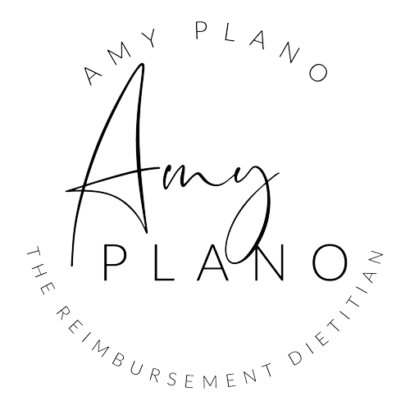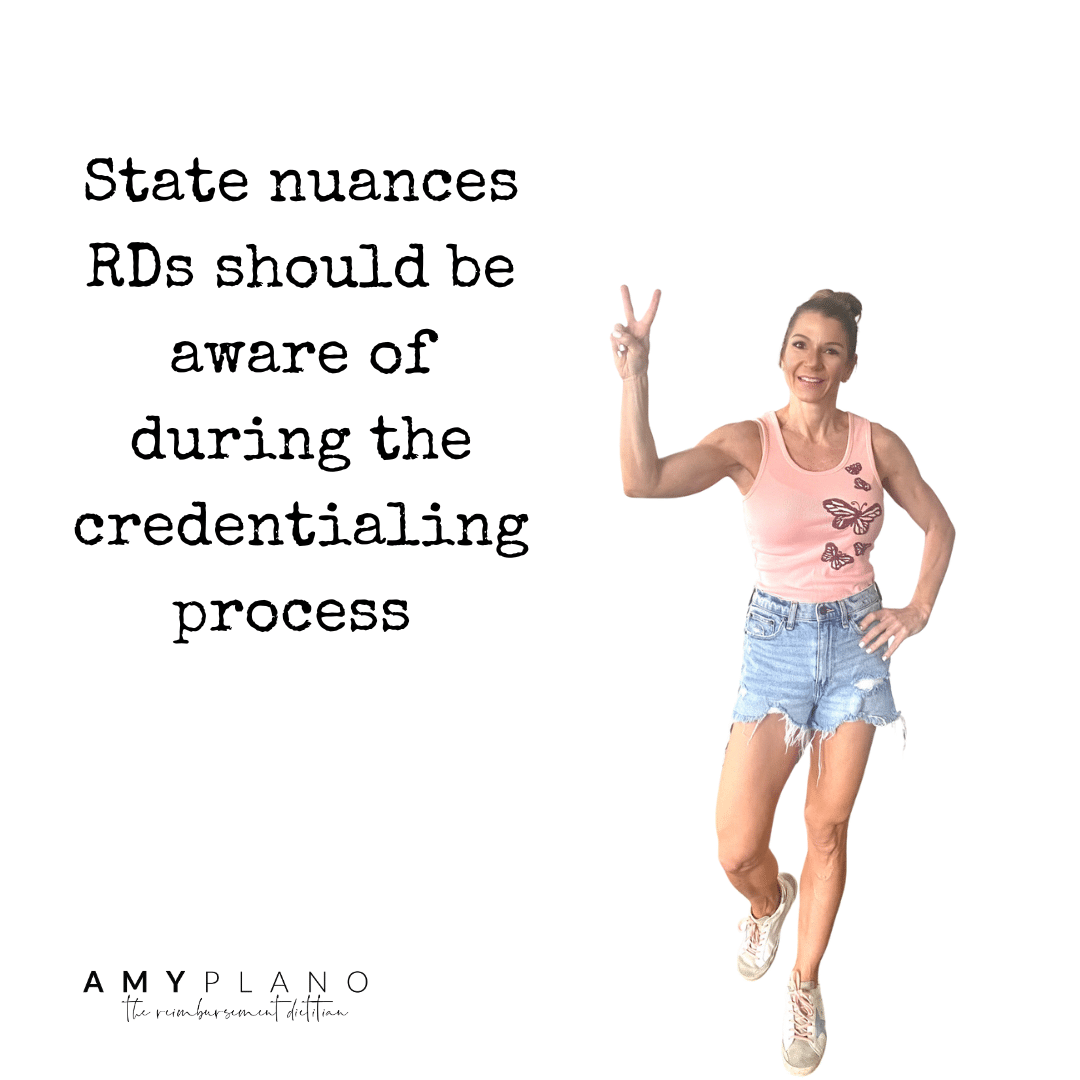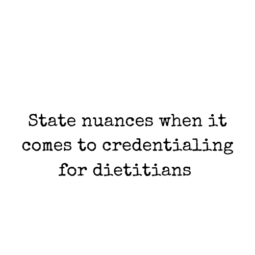Today I wanted to chat about the credentialing state nuances registered dietitians may experience during the insurance credentialing process.
In my tenure as a reimbursement coach to many ah-mazing ROCK-RDs, I have had the privilege of working with RDs in every single US state. Therefore, while I know reimbursement in CT like the back of my hand, I am no stranger to the reimbursement process in all states.
When it comes to credentialing, certain states are easy-peasy. At the same time, other states will give RDs a run for their money. I want you to know as much as possible before jumping into my coaching program. So please read the following carefully. I have tried to outline any nuances I know with particular states. I updated this blog regularly to reflect contemporary changes.
Closed Networks – what does it mean
When I refer to an insurance network being ‘closed,’ the insurance company implies that there are already enough dietitians in that particular zip code—most of the time, that is complete bullshit. I teach you how to appeal to closed networks in my program. And MANY RDs are super successful after taking my advice and following my writing samples for appeals. The only networks I have NOT seen an RD penetrate are Empire BCBS in NY, Florida Blue, and Michigan BCBS. I talk more about those below.
States that make it a wee bit more challenging to credential
Florida – I have written extensively about the issues with credentialing in Florida. You can read about what I know HERE. Unfortunately, no networks aside from Medicare are open for RDs located in Florida.
In some zip codes, Aetna is open but it is not a traditional Aetna plan. It is a discount plan and only pays a flat rate per visit I believe it is $65/visit for an initial visit. And $50 for a follow-up visit. These visits don’t have a time frame attached to them. Meaning it could be a 15-minute initial visit or a 60-minute initial visit. You are paid per visit independent of how long you spend with the client. This is super atypical. For reference, my Aetna coverage in CT pays >$160/hour.
In some zip codes, you can credential with Oscar which is a small insurance plan with modest coverage. Also, certain Medicaid plans may be open. However, the status of those plans changes frequently. So that is why I am identifying them.
Michigan – Similar to Florida. I have written extensively about the issues with credentialing in Michigan. You can read about what I know HERE. Unfortunately, few networks aside from Medicare are open for RDs in Michigan.
While participating with Medicare can be advantageous depending on the population you serve, most Medicare plans are what we call Advantage plans. They are a Medicare plan managed by a commercial carrier. For example, the United Health Care Medicare Advantage plan. You need to be in with BOTH United Health Care and Medicare. Therefore, getting credentialed with Medicare can still be limiting as you can’t service patients with Medicare Advantage plans.
Some RDs have reported being able to get into Aetna and United Health Care. While other RDs have told me this is not possible.
North Carolina—Certain areas of NC are closed to accepting new United Health Care providers. However, many RDs successfully appeal to and get into the network. In addition, while your BCBS product pays very well, it takes a LONG time for them to complete the credentialing process. I would say I am seeing it take, on average, about seven months. That should not stop you. But my words of wisdom are to get your application in NOW and worry about the details later.
South Carolina – Most plans in SC DO cover nutrition, but getting access to bill them is crucial. You can only bill if you file through a contract from a different state. However, the substantial glaring issue is that the SC State plan (PEBA) for state employees has a specific exclusion for nutrition coverage, and it covers a LOT (>100k) of members. I will add that nearly all marketplace plans in SC cover unlimited nutrition visits, and these cover a growing percentage of people. several plans (ZCV, ZCW, ZCU, possibly ZCF, federal, and some other acronyms DO have nutrition benefits, but they are “housed” inside the ACA preventative benefits umbrella. And these plans DON’T have the specific nutrition counseling exclusions like some plans in SC. We have been able to successfully bill SC plans from our NC office/NC contract for 4 years with no issues.
The above statement for South Carolina was created with support from your awesome Insurance Payment Specialist for South Carolina, Jeremy Ponds, RD, who has been working tirelessly to improve access for RDs to bill your SC BCBS product.
New York – If you are in the Manhattan and Westchester areas of NY, you may find certain insurance networks are closed. The insurance companies credential by zip code. Currently (2024), the Empire BCBS network is closed. This is a big obstacle if you are credentialing in NY.
However, NY based dietitians can NOW apply to Anthem BCBS through American Speciality Health. By being in-network with Anthem BCBS you can ALSO bill all Empire BCBS products. In each state BCBS is almost always your BIGGEST product. Therefore, many RDs are getting an address in a different state for their physical office address; and are credentialing through a different state for their BCBS. It is extremely challenging to be an insurance-based RD and not accept BCBS. It will make up a huge chunk of your referrals. So if you are contemplating applying for my program I would like you to think about the out-of-state physical office option. By getting credentialed in a state where the network is open you will be able to see most PPO plans (including NY) with no issues.
Fidelis, WellCare, Oxford, Affinity. Certain zip codes in NY United Health Care appear closed as well.
Emblem GHI (March 2024) is now open.
If you are in Northern or Western NY, most of the insurance networks are open, including BCBS of Western New York.
In addition, if you are located in New York the legal business entity you likely want to set up is a PLLC NOT an LLC. This statement doesn’t constitute legal advice; but speaking with several dietitians in NY who have worked with CPAs this is what they were recommended to do given the nature of our scope as dietitians.
California – ALL patients seen in CA, regardless of whether or not they are cash-paying or insurance, require an MD referral. This is based on your licensure laws or essential lack there of. Aetna appears open in most zip codes, while Cigna appears closed in most zip codes. Blue Shield of California, which is not the same as Anthem Blue Cross Blue Shield, will only accept you if you are a sole proprietor or S-Corp. They don’t accept dietitians whose business entity is an LLC. To my knowledge, United Health Care appears open in most zip codes. The biggest product in CA is Anthem BCBS is open. However, I would say, on average, it takes about 6-7 months to have an effective contract.
California Statute “[A] registered dietitian, or other nutritional professional meeting the qualifications [of this statute] may, upon referral by a health care provider authorized to prescribe dietary treatments, provide nutritional and dietary counseling, conduct nutritional and dietary assessments, and develop nutritional and dietary treatments, including therapeutic diets, for individuals or groups of patients in licensed institutional facilities or in private office settings.” Cal. Bus. & Prof. Code, § 2586 (emphasis added).
Alabama – All patients seen in AL, regardless of whether they are cash-pay or insurance, require an MD referral. This is based on your licensure laws.
Alabama Statute “[A] dietitian/nutritionist or registered dietitian … may [provide such dietetic services as nutritional assessments and nutrition counseling] upon referral by a health care provider authorized to prescribe dietary treatments“, and “[d]ietitians/nutritionists may offer advice and counsel on dietetics and nutrition as adjunct medical therapy when advice and counsel is given upon referral of a licensed physician.” Ala. Code 1975 §§ 34-34-2 and 34-34A-5 (emphasis added). [“Adjunct medical therapy” is not otherwise defined.]
Tennessee – All patients seen in Tennessee, regardless of whether they are cash-paying or insurance, require an MD referral. This is based on your licensure laws.
Tennessee Statute A licensed dietitian or nutritionist may generally engage in the practice of dietetics, but may not develop a “therapeutic dietary regimen” unless it is “pursuant to the appropriate orders and/or referral of licensed practitioners of medicine, osteopathy, chiropractic, dentistry, or podiatry when incidental to the practice of their respective professions.” Tenn. Code Anno., §63-25-105. [Unfortunately, the term “therapeutic dietary regimen” is not defined or otherwise referenced in the statute.]
Iowa – The majority of your networks are open. But your BCBS product (Wellmark) doesn’t credential dietitians in-network. Therefore, you can apply to be an out-of-network provider with Wellmark. You will get paid. But it is a little wonky as the money goes directly to the patient for the services. But RD MNT services are covered.
Colorado – Aetna and United Health Care may be closed to new providers in certain zip codes. Your BCBS product is a discount plan. And not a ‘normal’ plan. This means it pays per visit (not per 15-minute increments like most plans) independent of the time you spend with the client. I have been told that the best zip code for open networks is in Denver. Many RDs in CO have appealed to the closed networks successfully and have gotten in.
Similar to NY (see above) if you can and have a physical address to use in a different state for your BCBS product I would do that. The Anthem BCBS (through ASH) is one one of the lowest payers in the United States.
Minnesota – Unfortunately, you can’t credential directly with Cigna and Aetna in Minnesota. However, you can credential for Aetna with Allina, which is their affiliate. For Cigna, you will credential through Health Partners.
Well, that is all I have for you today. I really believe that knowledge is power when it comes to running a successful private practice. So I am hoping you find this information helpful. If you are an RD in a state where I might have missed the nuances, let me know below in the comments. I really think the more we can share about insurance, the less freaky accepting it may seem.
Cheers to kicking butt and taking names.




Reader Interactions